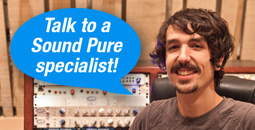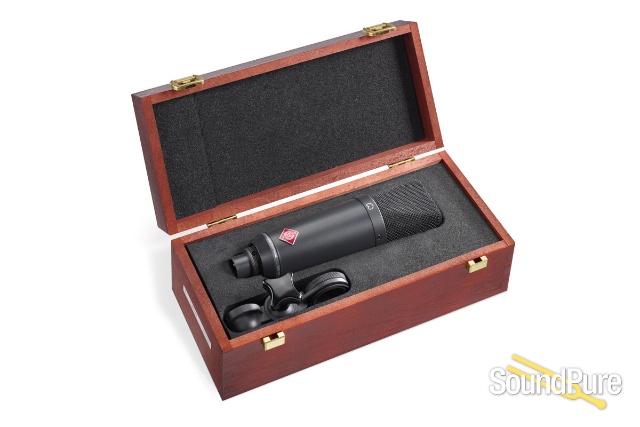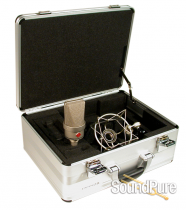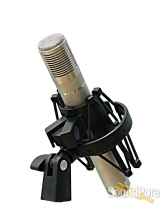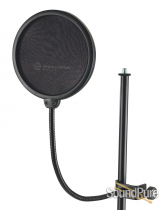The TLM 193* is a large diaphragm microphone with a cardioid polar pattern. With this microphone Neumann continues its long tradition, and is offering high end technology at an affordable price for musicians and the home recording studio.
The microphone uses a transformerless circuit, featuring extremely low self noise and large dynamic range.
The polar response is very linear over a wide incidence angle. Thus, even signals coming from the side are reproduced faithfully and without coloration. The exposed surface of the microphone capsule is at ground potential, making it immune to typical interference and contamination. The microphone is supplied with a swivel mount.
Applications
The TLM 193 is a microphone with cardioid characteristic for professional recording and live applications. It is the ideal microphone for professional productions, for musicians and project studios.
Polar pattern
The TLM 193 has a large diaphragm capsule with cardioid characteristic.
Acoustic features
The TLM 193 is addressed from the front, marked with the Neumann logo. The large diaphragm capsule inside the headgrille has a very smooth frequency response for all polar patterns over a wide acceptance angle. The curves are flat and parallel to the 0° frequency curve up to 10 kHz within a pickup angle of ± 100°.
The TLM 193* is a large diaphragm microphone with a cardioid polar pattern. With this microphone Neumann continues its long tradition, and is offering high end technology at an affordable price for musicians and the home recording studio.
The microphone uses a transformerless circuit, featuring extremely low self noise and large dynamic range.
The polar response is very linear over a wide incidence angle. Thus, even signals coming from the side are reproduced faithfully and without coloration. The exposed surface of the microphone capsule is at ground potential, making it immune to typical interference and contamination. The microphone is supplied with a swivel mount.
Applications
The TLM 193 is a microphone with cardioid characteristic for professional recording and live applications. It is the ideal microphone for professional productions, for musicians and project studios.
Polar pattern
The TLM 193 has a large diaphragm capsule with cardioid characteristic.
Acoustic features
The TLM 193 is addressed from the front, marked with the Neumann logo. The large diaphragm capsule inside the headgrille has a very smooth frequency response for all polar patterns over a wide acceptance angle. The curves are flat and parallel to the 0° frequency curve up to 10 kHz within a pickup angle of ± 100°.
The TLM 193 differs from omnidirectional pressure transducers, where, due to physical reasons, the diffuse-field and free-field responses never agree. This microphone has a very even diffuse-field response for all polar patterns. This is important in a reverberant environment, as more reflections arrive at the microphone from different directions.
The acoustic information is not affected in its tonal quality when recorded by the microphone. This characteristic is achieved without resorting to corrective resonance effects. Therefore, the microphone maintains an excellent impulse response reproducing all transient phenomena of music and speech without coloration.
Electrical features
The letters TLM stand for "transformerless microphone". With TLM technology the usual output transformer is replaced by an electronic circuit.
As with traditional transformers, it ensures good common mode rejection, and prevents RF interference, that may influence the balanced audio signal.
Compared to other microphones the self noise level of the TLM 193 is considerably reduced. As it is capable of handling sound pressure levels up to 140 dB without distortion, the TLM 193 provides a dynamic range of 130 dB (A-weighted).
Operational safety
All exposed surfaces of the microphone capsule, including the diaphragms, are at ground potential. This technology makes them highly immune to electrical and atmospheric interference and contamination through microscopic dust particles.
The capsule is elastically mounted to avoid any structure borne noise that could interfere with its operation.
The frequency response of the TLM 193 amplifier is linear down to 20 Hz. Even very low bass signals are reproduced without coloration.
This implies that the microphone becomes more sensitive to subsonic frequencies, from structure borne noise or pop and wind noise.
To avoid any LF interference, we recommend to use the EA 1 elastic suspension, the PS 15 pop screen, or the WS 89 windscreen.
*The design of the microphone is a registered design of the Georg Neumann GmbH in certain countries.
The TLM 193 differs from omnidirectional pressure transducers, where, due to physical reasons, the diffuse-field and free-field responses never agree. This microphone has a very even diffuse-field response for all polar patterns. This is important in a reverberant environment, as more reflections arrive at the microphone from different directions.
The acoustic information is not affected in its tonal quality when recorded by the microphone. This characteristic is achieved without resorting to corrective resonance effects. Therefore, the microphone maintains an excellent impulse response reproducing all transient phenomena of music and speech without coloration.
Electrical features
The letters TLM stand for "transformerless microphone". With TLM technology the usual output transformer is replaced by an electronic circuit.
As with traditional transformers, it ensures good common mode rejection, and prevents RF interference, that may influence the balanced audio signal.
Compared to other microphones the self noise level of the TLM 193 is considerably reduced. As it is capable of handling sound pressure levels up to 140 dB without distortion, the TLM 193 provides a dynamic range of 130 dB (A-weighted).
Operational safety
All exposed surfaces of the microphone capsule, including the diaphragms, are at ground potential. This technology makes them highly immune to electrical and atmospheric interference and contamination through microscopic dust particles.
The capsule is elastically mounted to avoid any structure borne noise that could interfere with its operation.
The frequency response of the TLM 193 amplifier is linear down to 20 Hz. Even very low bass signals are reproduced without coloration.
This implies that the microphone becomes more sensitive to subsonic frequencies, from structure borne noise or pop and wind noise.
To avoid any LF interference, we recommend to use the EA 1 elastic suspension, the PS 15 pop screen, or the WS 89 windscreen.
*The design of the microphone is a registered design of the Georg Neumann GmbH in certain countries.











